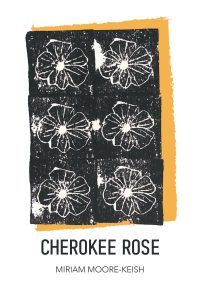
by Dalton Greene ’22
Macalester’s English majors tend to get up to a lot after graduating and moving into the always-looming real world. One such busybody is Miriam Moore-Keish ‘19, who, having earned an MPhil at Cambridge just last year, is now preparing for the release of her new book, Cherokee Rose. The collection of poetry, forthcoming from Finishing Line Press and available for pre-order now, ruminates on memory and identity within the context of the American South. Excited to hear more from the author herself, The Words caught up with Miriam to discuss the writing process, publishing during a pandemic, and, of course, the role the Macalester English department had in bringing her to this point.
You’ve described Cherokee Rose as “a tiny revolution.” Could you share a little more about that? What does the book address, how did you develop the concept, what do you hope readers will take away from it?
I think any act of writing is pretty revolutionary. I remember writing an article for The Words (when I was an editor) about Gary Snyder’s 2018 visit to campus when he said that poetry has no role in social change. I tried to be impartial in my article, but I didn’t agree with him at all! I’m thinking about Danez Smith’s poem “my poems” from Homie here, too. They say what I want to say to Gary Snyder: that a poem can do so many things. It’s an act of radical communication even when we think of reading as a fairly isolated experience.
Cherokee Rose seems to address both meanings of “revolution.” I looked it up just now, and it can mean both change in systems or ideas and revolving/turning around. I attempt to comment on growing up in the American South, the joys and pains around the collective memory of Southerners, and some of the stereotypes and complexities that come with it all. When I was writing my Master’s dissertation, I found a phrase describing Southern Appalachia as America’s “internal Other.” And any time an Other speaks, they speak a revolution (not that I’m super marginalized or anything, don’t set Said’s ghost on me). Cherokee Rose also involves a lot of reflection on the past––both mine and my family’s––so I am revolving, so to speak, to write about that past.
But I don’t know if I ever sat down and decided on a concept for the collection. I’m pretty confident I didn’t. I’ve talked about this with other poet friends from the South and it seems that anyone who has roots down there has almost a compulsion to write about it and process it. Natasha Tretheway is my favorite example of this. I’m hoping that Southern readers will see some of themselves in the collection, and readers from elsewhere will add a little nuance to their perceptions of the American South. I have a flashbulb-like memory of being in a car with a Mac student during my first year. They turned to me and said “what’s it like being from a place that’s so racist?” Maybe 30 seconds later, they looked out the window and locked the doors as a Black man crossed the street in front of us. I’m not saying the South is free of all sins. Nothing like that. But it’s been used as a scapegoat for so many universal issues, and I’m so over it. I want Cherokee Rose to be both a love letter to where I’m from, and a force that holds it accountable for its actions.
What has publishing been like now, in the midst of the pandemic? Are there any particular experiences that have shed new light on any aspects of writing and/or publishing for you?
I do have these cute little publicity postcards that my publisher made me, and usually I would deliver them by hand, but I’m having to mail them all so I’m spending a lot more money on stamps and postage than anticipated. That’s one difference. It’s weird! Getting the book deal was pretty standard (I actually had three offers for the manuscript, so I got to choose my publisher and feel like a very hot commodity), as was the editing process, but figuring out publicity when I can’t actually be public with it? I don’t know what’s going on. I’m wondering if I should have a Zoom release party? It’s possible that doing everything virtually means that I can reach more geographic areas that I wouldn’t otherwise, like all my friends from Cambridge, all my family in Georgia, Florida, and the Carolinas, etc., but who is realistically craving an evening of events on their screens after staring at them all day?
Looking back, did any of your experiences at Macalester play a big role in shaping this book and/or your trajectory as a writer?

The artist for the cover art, Coco Banks, is also a fellow Mac alum, which is pretty cool. We were on Chanter staff together, and I don’t think I would have a cover design quite as beautiful without that connection.
I only took one creative writing class at Mac, which was my FYC with Peter Bognanni, and I don’t think I wrote anything good at all. Peter was great, I was just cocky and read too much Vonnegut–just kidding, there’s no such thing as too much Kurt. Reading poetry seems to be the primary way that I write it. I wrote one of the poems in the collection during a Chanter meeting after reading a submission that reminded me of something (though I promise I was very focused in Chanter meetings otherwise). So I think those kinds of little moments shaped Cherokee Rose more than any class did.
Cherokee Rose is available for pre-order now through March 19 and will be released May 14. The Words extends a massive thank you to Miriam and congratulates her for her success!